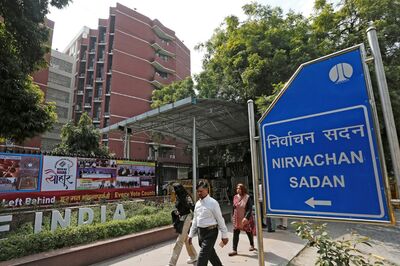
views
Sabha: Libya's transitional government delivered 20 million dinars ($16 million) on Tuesday to this remote southern city beset by fighters loyal to Muammar Gaddafi, hoping to bolster support for revolutionary forces. On the other side, Gaddafi's son was seen in a video for the first time since Tripoli fell, trying to rally the remnants of his father's regime.
Journalists accompanied the oil and finance minister, Ali al-Tarhouni, and the cash on the first flight to touch down in the desert city of Sabha since a NATO enforced no-fly zone order in March. The 20 boxes of 20-dinar notes, each weighing 116 pounds (78 kilograms), were delivered to the Sabha central bank.
Revolutionary forces have gained control of much of the area but still face heavy resistance.
"The forces inside these areas are not opposed to joining us but they do not want to disarm," said Ahmed Bashir, spokesman for Libya's National Transitional Council in Sabha. "They have the weapons and no manpower. We have the manpower and lighter weapons."
More than a month after sweeping into Tripoli and ending Gaddafi's nearly 42-year rule, the fugitive leader's supporters are still putting up a fierce fight on three fronts: in Gaddafi's hometown of Sirte, the town of Bani Walid southeast of the capital and in pockets in the country's vast desert south, including Sabha. Most of the recent fighting has occurred in Bani Walid and the Mediterranean coastal city of Sirte.
Gaddafi's whereabouts are unknown, although he has exhorted his supporters to fight on several times in audio messages. His son, Seif al-Islam, also was shown in an amateur video recording Tuesday on the Syrian-based Al-Rai TV, which has become the former regime's mouthpiece.
The video shows Seif cheering and waving with a machine gun in his hand. While he has sported a beard in past appearances, Tuesday's video showed him shaven and wearing a camouflage jacket.
He pumps his fist in the air and addresses a crowd, but there was no audio.
The TV station reported the video was taken Sept. 20 in one of the besieged towns, but did not say which one. Many have speculated that Seif al-Islam is still hiding in Bani Walid.
It appears to be his first appearance since Aug. 23, three days after revolutionary forces entered Tripoli. There had been reports of his capture at the time, but he turned up in front of cheering supporters in the capital.
Seif al-Islam was long the voice of reform in the authoritarian regime, but he threw his support behind his father after the uprising began in mid-February and became a civil war.
Like his father, Seif al-Islam Gaddafi has been charged by the International Criminal Court with crimes against humanity for the regime's bloody efforts to repress the uprising.
In Sabha, revolutionaries are based in the city's largest neighborhood, al-Gurtha. They have set up a national council office and checkpoints on roads leading to areas where Gaddafi loyalists refuse to hand over their weapons. Residents are able to cross checkpoints into Gaddafi loyalist-held areas, but only if they have family inside, and even then they risk being accused of being Gaddafi supporters.
Bashir said the area has no Gaddafi brigades, but there are worries that armed Gaddafi loyalists may ambush revolutionary forces from the desert.
In Sirte, commanders said Libyan revolutionary forces battled their way into the eastern outskirts in a bid to link up with anti-Gaddafi fighters besieging the city from the west. Anti-Gaddafi forces first attacked Sirte nearly two weeks ago, but have pulled back in the face of heavy rocket fire and loyalist snipers.
Abdel-Basit Haroun, a revolutionary field commander, said fighters reached a roundabout less than six miles (10 kilometers) east of the city center. He said the plan was for the forces from the east and west to meet inside Sirte.
"We are almost there, but the hard phase of the takeover has just begun," Haroun said in a telephone interview from the eastern city of Benghazi. "We stopped using heavy weapons because the residential areas are packed with families, children and women. We are also facing snipers all over the rooftops of tall buildings."
A revolutionary brigade commander on the city's western front, Al-Tohami Abu Zayan, said anti-Gaddafi forces can take Sirte "whenever we choose," but are holding back to protect civilians. He said fighters are in touch with civilians inside and working to secure them a way out of the city.
For nearly two weeks, revolutionary forces have regularly fired mortars, Grad rockets and tank shells into the city. Civilians have been fleeing for days, driven out by the fighting as well as deteriorating living conditions, including shortages of food, water and medicine.
The fighters besieging Sirte have received a boost from NATO airstrikes, which have played a key role in decimating Gaddafi's military forces since the alliance first intervened in the Libyan civil war in March. British Maj. Gen. Nick Pope said Royal Air Force aircraft struck targets in Sirte and Bani Walid on Monday.
"In Sirte, a formation of Tornado GR4s attacked ammunition stores, destroying their targets with Paveway guided bombs," he said.
He said strikes also hit Bani Walid after NATO reconnaissance identified a psychological warfare center and a firing position used by Gaddafi forces.
NATO said about 200,000 Libyan civilians are still threatened by forces loyal to the country's former regime, primarily in Sirte and Bani Walid.
"Remaining Gaddafi forces refuse to recognize their defeat. As a last resort, they are hiding in civilian areas," NATO spokesman Col. Roland Lavoie said at a news conference in Naples.
Forces loyal to the former regime are looking for Gaddafi opponents, taking them hostage and sometimes executing them, Lavoie said. But he said the loyalists cannot hold out long and NATO's mission would end soon.
Meanwhile, a Tunisian judicial official said Libya's former prime minister has been freed from jail after an appeals court overturned his conviction for illegally entering Tunisia.
Al-Baghdadi al-Mahmoudi was arrested Sept. 22 on charges of illegal entry after he was found without a visa as he tried to flee across the border to Algeria. He was convicted the same day and sentenced to six months in prison.
Libya's transitional government said last week it would ask Tunisia to send al-Mahmoudi home to face justice. A justice ministry spokesman says no official extradition demand has been made.




















Comments
0 comment